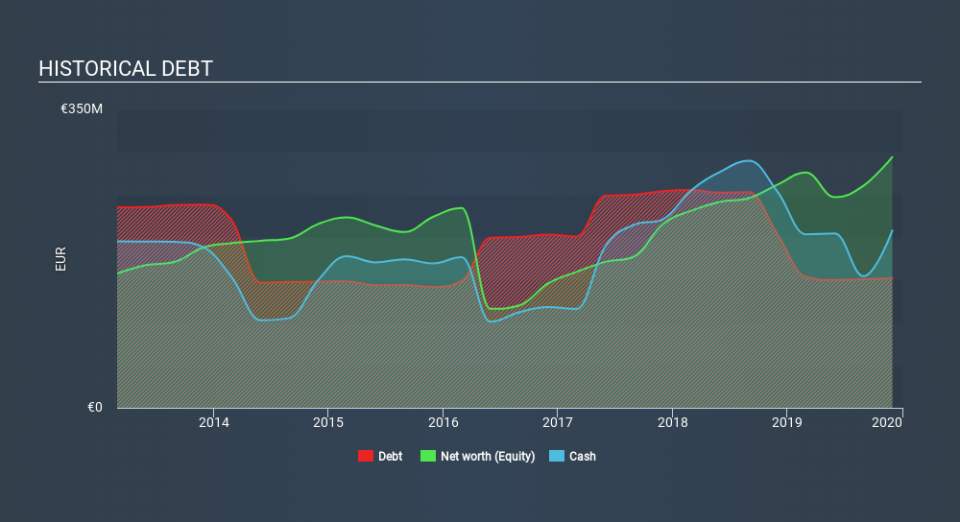Is Kaufman & Broad (EPA:KOF) Using Too Much Debt?

The external fund manager backed by Berkshire Hathaway's Charlie Munger, Li Lu, makes no bones about it when he says 'The biggest investment risk is not the volatility of prices, but whether you will suffer a permanent loss of capital. When we think about how risky a company is, we always like to look at its use of debt, since debt overload can lead to ruin. We can see that Kaufman & Broad S.A. (EPA:KOF) does use debt in its business. But is this debt a concern to shareholders?
When Is Debt A Problem?
Debt assists a business until the business has trouble paying it off, either with new capital or with free cash flow. Ultimately, if the company can't fulfill its legal obligations to repay debt, shareholders could walk away with nothing. While that is not too common, we often do see indebted companies permanently diluting shareholders because lenders force them to raise capital at a distressed price. Of course, debt can be an important tool in businesses, particularly capital heavy businesses. When we examine debt levels, we first consider both cash and debt levels, together.
See our latest analysis for Kaufman & Broad
How Much Debt Does Kaufman & Broad Carry?
As you can see below, Kaufman & Broad had €152.1m of debt at November 2019, down from €203.4m a year prior. However, its balance sheet shows it holds €208.1m in cash, so it actually has €56.0m net cash.
A Look At Kaufman & Broad's Liabilities
The latest balance sheet data shows that Kaufman & Broad had liabilities of €1.04b due within a year, and liabilities of €237.5m falling due after that. Offsetting these obligations, it had cash of €208.1m as well as receivables valued at €723.4m due within 12 months. So it has liabilities totalling €342.4m more than its cash and near-term receivables, combined.
While this might seem like a lot, it is not so bad since Kaufman & Broad has a market capitalization of €825.6m, and so it could probably strengthen its balance sheet by raising capital if it needed to. However, it is still worthwhile taking a close look at its ability to pay off debt. Despite its noteworthy liabilities, Kaufman & Broad boasts net cash, so it's fair to say it does not have a heavy debt load!
On the other hand, Kaufman & Broad saw its EBIT drop by 6.1% in the last twelve months. If earnings continue to decline at that rate the company may have increasing difficulty managing its debt load. When analysing debt levels, the balance sheet is the obvious place to start. But it is future earnings, more than anything, that will determine Kaufman & Broad's ability to maintain a healthy balance sheet going forward. So if you want to see what the professionals think, you might find this free report on analyst profit forecasts to be interesting.
But our final consideration is also important, because a company cannot pay debt with paper profits; it needs cold hard cash. Kaufman & Broad may have net cash on the balance sheet, but it is still interesting to look at how well the business converts its earnings before interest and tax (EBIT) to free cash flow, because that will influence both its need for, and its capacity to manage debt. Over the last three years, Kaufman & Broad recorded free cash flow worth a fulsome 80% of its EBIT, which is stronger than we'd usually expect. That positions it well to pay down debt if desirable to do so.
Summing up
Although Kaufman & Broad's balance sheet isn't particularly strong, due to the total liabilities, it is clearly positive to see that it has net cash of €56.0m. The cherry on top was that in converted 80% of that EBIT to free cash flow, bringing in €71m. So we are not troubled with Kaufman & Broad's debt use. There's no doubt that we learn most about debt from the balance sheet. However, not all investment risk resides within the balance sheet - far from it. Consider for instance, the ever-present spectre of investment risk. We've identified 3 warning signs with Kaufman & Broad (at least 1 which can't be ignored) , and understanding them should be part of your investment process.
When all is said and done, sometimes its easier to focus on companies that don't even need debt. Readers can access a list of growth stocks with zero net debt 100% free, right now.
If you spot an error that warrants correction, please contact the editor at editorial-team@simplywallst.com. This article by Simply Wall St is general in nature. It does not constitute a recommendation to buy or sell any stock, and does not take account of your objectives, or your financial situation. Simply Wall St has no position in the stocks mentioned.
We aim to bring you long-term focused research analysis driven by fundamental data. Note that our analysis may not factor in the latest price-sensitive company announcements or qualitative material. Thank you for reading.

 Yahoo News
Yahoo News 

